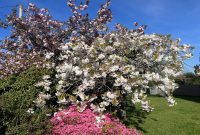2u.ie – making your day extra special
Just at sunset, the clouds parted during the week, allowing the beautiful light to breakthrough at Altamount, Millstreet, Co.Cork
On This Day
On April 25th 1990 the Hubble space telescope is placed into orbit by space shuttle Discovery. Down through the years since, it has taken many amazing photos of our universe helping scientists make fascinating discoveries.
Birthday’s Today
William Roache (Best known as Ken Barlow in Coronation Street) is 92
Al Pacino (Movie Actor) is 84
Sara Paxton (TV Actress) is 36
Interesting Quote for Today
“Look deep into nature, and then you will understand everything better.” ~Albert Einstein
Saint For Today:
Saint of the Day is St Mark the Evangelist. He is also known as John Mark. He was an Evangelist, Martyr, Missionary, Preacher, Teacher, Friend and Assistant to St Peter, St Paul and a cousin of St Barnabas. He is the patron saint of many different things, including lions, lawyers, notaries, opticians, pharmacists, painters, secretaries, interpreters and prisoners. He is also the Patron Saint of Venice.
Significance of Today
April 25th is also International Noise Awareness Day and is celebrated every year on April 25th . It helps spread awareness about the effects of noise on our welfare and health. We live in a noisy world and we are growing more uncomfortable with silence and quietness.
Did You Know:
Did you know you can tell if an egg is old based on whether it floats in water? If an egg floats when you set it in water, then it’s old; if it sinks, it’s a fresher egg and you’re good to go
My Latest Videos🎥
To mark Earth Day last Monday I reshared this video. I will post a new video this Thursday morning and it is called ‘The Invitation to turn to Light and Hope’
Thought for Week
Even if you’re little, you can do a lot, you mustn’t let a little thing like little stop you’ ~from the musical Matilda
It is amazing how the weather can be such a topic of conversation. It is great this weekend that we can all finally enjoy some lovely dry sunny weather. It is also such a welcome break for our farming community too. They will be so busy these days catching up on jobs that were on hold for so long because of the weather.
It is true how the weather can influence our mood and this weekend we can allow our spirts lift and get outdoors to feel the beauty of spring unfold all around. It reminds me of the musical ‘Matilda’ and one of its key songs is called ‘When I Grow Up’ and at its heart is a wish to be positive, upbeat and that nothing is impossible if we truly believe that it will happen.
But for many people it’s the little things that become the stumbling blocks. In our Gospel stories Jesus is the one who constantly helped people remove the obstacles that stopped people living their lives to the full. We worry about all that happened yesterday and what will happen tomorrow and forget all that today has to offer.
We often say it’s the little things that matter and they do. The invitation is to allow them to become stepping stones to appreciating the beauty of the present moment. Life can so often be complicated and difficult. The little moments get squashed and trampled upon. This week is a lovely opportunity to reclaim and celebrate the smaller moments of your life. It is dropping the letter t in I can’t to leave I can!
Thought For The Week is updated each Monday



